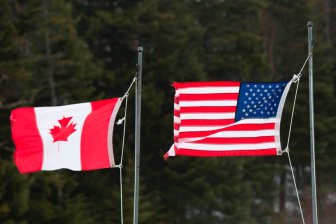U.S. Defense Secretary Pete Hegseth told NATO on Wednesday that while the U.S. “remains committed” to the military alliance, it is prioritizing its own security and preventing conflict with China.
Hegseth told NATO allies in Brussels that Europe would need to take on more responsibility in “safeguarding European security.”
“The United States remains committed to the NATO alliance and to the defence partnership with Europe. Full stop,” Hegseth said.
“But the United States will no longer tolerate an imbalanced relationship which encourages dependency. Rather, our relationship will prioritize empowering Europe to own responsibility for its own security.”
That security includes Ukraine.
Many allies have been waiting for clarity on how much military and financial support Washington will continue to provide the Ukrainian government under President Donald Trump‘s administration.
Instead, NATO officials and members were told they would have to take on more responsibility.
Hegseth said Europe would need to provide the “overwhelming share of future lethal and non-lethal aid to Ukraine.”

The secretary also said NATO membership for Ukraine was unrealistic and that the likelihood of Kyiv regaining its pre-2014 borders, including Crimea, was also unlikely.
“We want, like you, a sovereign and prosperous Ukraine. But we must start by recognizing that returning to Ukraine’s pre-2014 borders is an unrealistic objective,” he said, calling that an “illusionary goal.”
“A durable peace for Ukraine must include robust security guarantees to ensure that the war will not begin again. This must not be Minsk [agreements] 3.0. That said, the United States does not believe that NATO membership for Ukraine is a realistic outcome of a negotiated settlement.”
His comments came shortly before Trump announced on his Truth Social platform that he had a “lengthy and productive” phone call with Russian President Vladimir Putin on Wednesday.

Get breaking National news
For news impacting Canada and around the world, sign up for breaking news alerts delivered directly to you when they happen.
“We want to stop the millions of deaths taking place in the War with Russia/Ukraine. President Putin even used my very strong Campaign motto of, ‘COMMON SENSE.’ We both believe very strongly in it. We agreed to work together, very closely, including visiting each other’s Nations,” Trump wrote.
“We have also agreed to have our respective teams start negotiations immediately, and we will begin by calling President Zelenskyy, of Ukraine, to inform him of the conversation, something which I will be doing right now.”
Russia annexed Crimea in March 2014 and then backed pro-Russian separatists in an armed insurgency against Kyiv’s forces in the eastern Donbas region of Ukraine.
Moscow currently controls 20 per cent of Ukraine’s territory, mostly in the east and south.
As part of security for Ukraine, Hegseth said if NATO troops are deployed as peacekeepers to Ukraine at any time, it should be done as part of a non-NATO mission so it is not covered under Article Five.
Article Five is a foundational principle of NATO, often referred to as “collective defence.”
Under the article, an attack against one member of NATO constitutes an attack against all and will prompt a joint response from the military alliance.
Article Five has been activated only once, when European allies and Canada used the collective security guarantee to help the United States in the wake of the Sept. 11, 2001, al-Qaeda attacks.
The U.S. also used the meeting in Brussels to remind those in attendance of Trump’s renewed calls for members to contribute more spending to defence.
All members of the alliance are expected to meet a benchmark of spending at least two per cent of gross domestic product (GDP) on defence.

In recent months, however, Trump has said more needs to be spent.
“Two per cent is not enough. President Trump has called for five per cent and I agree,” Hegseth said.
“Increasing your commitment to your own security is a down payment for the future. A down payment, as you said, Mr. Secretary [Mark Rutte], of peace through strength.”
The U.S. itself does not currently meet that five per cent rate expected by Trump.
European allies have hiked their military budgets since Putin ordered his troops into Ukraine, and 23 of them are estimated to have reached or exceeded last year’s target of spending two per cent of gross domestic product, but a third still fall short — including Canada.
Some U.S. allies worry that a hasty deal might be clinched on terms that aren’t favourable to Ukraine.
Before Hegseth spoke, NATO Secretary-General Mark Rutte told The Associated Press that Putin will only negotiate a peace deal with Ukraine if its backers continue to provide enough weapons and ammunition.
—with files from Reuters and The Associated Press
© 2025 Global News, a division of Corus Entertainment Inc.



